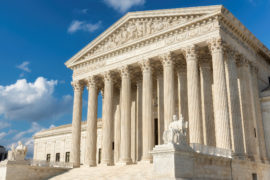Amid Debate Around SCOTUS Gerrymandering Case, Stanford’s Michael McConnell Shares Insights on Questions of Federalism
The United States Supreme Court heard oral arguments on December 7 in what is widely seen as one of the most significant cases in the country’s history to address fundamental questions of federalism.
Moore v. Harper asks whether the North Carolina Supreme Court violated the U.S. Constitution when it struck down the state legislature’s gerrymandered congressional map for violating the North Carolina Constitution. More broadly, the case implicates what the Constitution means when it delegates to each state’s legislature the job of regulating congressional elections and the appointment of presidential electors.
Is the legislature subject to the traditional oversight of state courts? Or can the legislature act alone, with no judicial oversight–a concept known as the “independent state legislature theory.” The theory asserts that the state legislatures’ power is so exclusive, according to a reading of the U.S. Constitution, that they can ignore the requirements even of their own state constitution.
If the Court breathes life into what had previously been considered a fringe legal doctrine, some argue it would upend centuries of legal tradition. No longer would state constitutions and courts be a check on election laws. The Supreme Court would be empowered to decide when state courts have overstepped their authority. Thousands of election policies and laws put in place by state agencies or enacted through ballot initiatives could be at risk of invalidation.

Here, following the oral arguments, Stanford Law School’s Michael McConnell, the Richard and Frances Mallery Professor and Director of the Constitutional Law Center, weighs in on the case and its potential impact.
How would you frame the issues in this case?
Article I, Section 4, Clause 1, provides that “the times, places, and manner” of holding elections for the U.S. Senate and House are to be “prescribed in each State by the Legislature thereof.” In Moore v Harper, the two parties and most of the amici have taken one of two extreme positions on the meaning of this clause.
One side essentially omits the words “by the Legislature thereof” and sees no problem with state courts assuming the function of drawing legislative districting maps. The other side argues that in exercising this power, the state legislatures are unconstrained by state constitutions or state court judicial review. There is, however, a middle ground: that state legislatures must pass the laws and draw the maps subject to ordinary constraints of constitutional law, but state courts cannot step in and do it for them. This conforms to ordinary rules of judicial review, in which courts may invalidate laws passed by the legislature if they are unconstitutional, but they cannot craft new ones. The middle ground does not give unilateral power to either legislatures or state courts, but preserves checks and balances for each.
This case has been called the biggest federalism issue of all time. Do you agree? Why?
There are two major federalism cases this year: Moore v Harper and National Pork Producers v. Ross. Moore has to do with the meaning of the term “legislature” for purposes of state legislative passage of laws governing the “time, place, and manner” of conducting congressional and presidential elections. Since the 1960s, it has become common for state courts, which are often elected in partisan elections, as well as federal courts, to second-guess state legislative maps, and often to draw their own. In Rucho v. Common Cause, in 2019, the Supreme Court largely took the federal courts out of the business of reviewing gerrymandering claims.
Depending on how the Court decides Moore v. Harper, it could reduce, but likely will not eliminate, the role of state courts, leaving state legislatures with greater authority — subject to congressional override. Pork Producers is potentially even more important. It is a case about interstate federalism rather than federal-state relations. The question is whether states like California or Texas, which have significant market power, can impose their laws on out-of-state production even if it has no effect within the state, on penalty of loss of access to the market.
Retired Judge Michael Luttig recently said Moore may have “profound consequences for American democracy” and others have asserted state legislatures could have the power to override the voters’ choice by installing their own slate of presidential electors. These are dramatic assertions. Do you agree? What are the implications of this case?
Some Trump-aligned lawyers argued that state legislatures had the power, after the election went against Trump, to nullify the reported results and choose their own electors. No credible lawyer agreed, and no state legislature took the bait. There is a clear and simple reason why post-election choice of electors would be unconstitutional: Article II, Section 1, Clause 4 gives Congress the power to set the “time of choosing the electors” (spelling and capitalization updated), and Congress has exercised this power by setting one specific election day (this year November 8). Legislatures cannot choose electors after that date. Moore v Harper will have no effect on this. It would, however, be helpful for Congress to amend the Electoral Count Act to eliminate any possibility of this or other misinterpretations.
Could Congress fix the potential problems regarding gerrymandering and control of state legislatures?
Article I, Section 4, Clause 1 gives Congress power to “at any time by law” to “make or alter” the laws passed by state legislatures governing congressional elections. If Congress wished to pass gerrymander reform, it could do so. Nothing a state legislature does under the authority of Moore v. Harper is exempt from Congress’s power to “make or alter such Regulations,” provided Congress does so “by law.”

If the Supreme Court uses this case to breathe full life into the “independent state legislature doctrine,” would the federal courts become the principal arbiters of election laws? Can you explain how that might play out and what it would mean to the federal docket?
Federal courts have been the final arbiters of election laws since Reynolds v. Sims in 1964. With one caveat, Moore v. Harper will not change that. The caveat is this: One of several possible interpretations of Article I, Section 4, Clause 1 is that state court rulings purporting to interpret (as opposed to override) state statutes might be regarded as unconstitutional if they plainly go beyond reasonable interpretation and impose rules not contemplated by the legislature. If that path is taken in Moore, federal courts in the future would be forced to distinguish between what interpretations are reasonable and what are not — kind of like administrative law under Chevron.
How important is judicial review of state election laws and political maps passed by state legislatures?
Quite important, as part of the checks and balances of the system. Before every election, the two parties challenge aspects of election law that are not to their advantage, and every 10 years, after redistricting, there is a flurry of litigation. The alarming thing about Moore is that both sides advocate giving essentially unlimited power to one branch of state government or the other: one side would empower state courts and one side would empower state legislatures. In my opinion, the Constitution is best read to divide authority over election law between the two, giving state legislatures sole power to make the laws, but subject to ordinary state and federal constitutional constraints.
Did anything surprise you about the December 7 oral arguments?
Nothing major. I was surprised that some of the Justices seemed unaware that in the 18th century, the executive veto was regarded as legislative in nature, which is why it is located in Article I rather than Article II. That is why it is undisputed in Moore that state governors can veto state election laws, including districting maps.
Michael W. McConnell is the Richard and Frances Mallery Professor and Director of the Constitutional Law Center at Stanford Law School, and a Senior Fellow at the Hoover Institution. From 2002 to 2009, he served as a Circuit Judge on the United States Court of Appeals for the Tenth Circuit.
